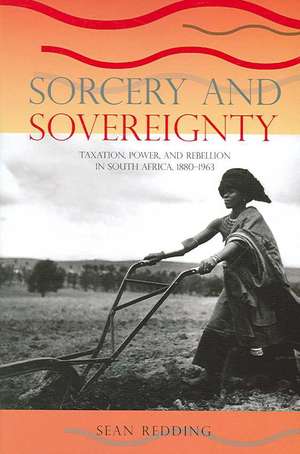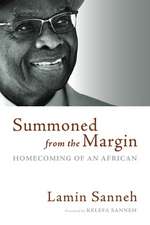Sorcery and Sovereignty: Taxation, Power, and Rebellion in South Africa, 1880–1963
Autor Sean Reddingen Limba Engleză Paperback – 31 oct 2006
Rebellions broke out in many areas of South Africa shortly after the institution of white rule in the late nineteenth century and continued into the next century. However, distrust of the colonial regime reached a new peak in the mid-twentieth century, when revolts erupted across a wide area of rural South Africa. All these uprisings were rooted in grievances over taxes. Rebels frequently invoked supernatural powers for assistance and accused government officials of using witchcraft to enrich themselves and to harm ordinary people.
As Sean Redding observes in Sorcery and Sovereignty, beliefs in witchcraft and supernatural powers were part of the political rhetoric; the system of taxation—with all its prescribed interactions between ruler and ruled—was intimately connected to these supernatural beliefs.
In this fascinating study, Redding examines how black South Africans’ beliefs in supernatural powers, along with both economic and social change in the rural areas, resulted in specific rebellions and how gender relations in black South African rural families changed. Sorcery and Sovereignty explores the intersection of taxation, political attitudes, and supernatural beliefs among black South Africans, shedding light on some of the most significant issues in the history of colonized Africa.
As Sean Redding observes in Sorcery and Sovereignty, beliefs in witchcraft and supernatural powers were part of the political rhetoric; the system of taxation—with all its prescribed interactions between ruler and ruled—was intimately connected to these supernatural beliefs.
In this fascinating study, Redding examines how black South Africans’ beliefs in supernatural powers, along with both economic and social change in the rural areas, resulted in specific rebellions and how gender relations in black South African rural families changed. Sorcery and Sovereignty explores the intersection of taxation, political attitudes, and supernatural beliefs among black South Africans, shedding light on some of the most significant issues in the history of colonized Africa.
Preț: 274.83 lei
Nou
Puncte Express: 412
Preț estimativ în valută:
52.59€ • 55.05$ • 43.77£
52.59€ • 55.05$ • 43.77£
Carte tipărită la comandă
Livrare economică 31 martie-14 aprilie
Preluare comenzi: 021 569.72.76
Specificații
ISBN-13: 9780821417058
ISBN-10: 0821417053
Pagini: 304
Ilustrații: illus
Dimensiuni: 152 x 229 x 23 mm
Greutate: 0.4 kg
Ediția:1
Editura: Ohio University Press
Colecția Ohio University Press
ISBN-10: 0821417053
Pagini: 304
Ilustrații: illus
Dimensiuni: 152 x 229 x 23 mm
Greutate: 0.4 kg
Ediția:1
Editura: Ohio University Press
Colecția Ohio University Press
Recenzii
“A new and exciting interpretation of colonial rule in South Africa revolving around the central importance of taxation in establishing the power of colonial state.”—Jeffrey Brian Peires, author of The Dead Will Arise: Nongqawuse and the Great Xhosa Cattle-Killing Movement of 1856-7
“This study is…both original and hugely thought provoking. It addresses head on a key issue that has often been ducked in South African historiography—how Africans understood the world they lived in—and it elevates the subject of witchcraft, which is now beginning to attract appropriate attention in South African studies, to center stage.”—The American Historical Review
“This richly detailed and long-awaited book joins a corpus of new work on culture and the political imagination in Africa. Based on extensive archival research and written in clear and accessible prose, Redding's work offers insight into how people have understood and contested colonial rule in South Africa.”—Journal of Southern African Studies
Notă biografică
Sean Redding is a professor of history at Amherst College. She is the author of several articles on South African history, particularly on changes in African rural life in the late nineteeth and twentieth centuries.
Descriere
Rebellions broke out in many areas of South Africa shortly after the institution of white rule in the late nineteenth century and continued into the next century. However, distrust of the colonial regime reached a new peak in the mid-twentieth century, when revolts erupted across a wide area of rural South Africa.










